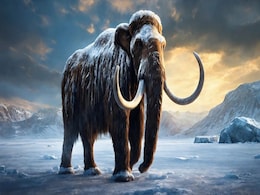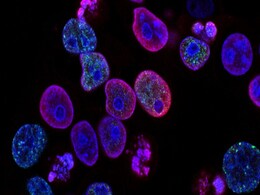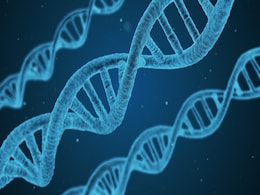Genetic Evolution
- All
- News
-

Iguanas Travelled 5,000 Miles to Fiji on Rafts 34 Million Years Ago
- Thursday March 20, 2025
- Written by Gadgets 360 Staff
Iguanas undertook a remarkable 5,000-mile journey from North America to Fiji around 34 million years ago. According to a new genetic study, these reptiles floated on rafts of vegetation, possibly due to extreme weather events. The research, published in PNAS, found that Fiji’s iguanas are closely related to North American species, contradicting e...
-
 www.gadgets360.com
www.gadgets360.com
-

Ancient Europeans Retained Dark Skin, Hair and Eyes Until the Iron Age, Claims New Study
- Monday March 17, 2025
- Written by Gadgets 360 Staff
A genetic study analysing 348 ancient DNA samples reveals that most prehistoric Europeans had dark skin, hair, and eyes well into the Iron Age. Although genes for lighter pigmentation appeared around 14,000 years ago, they remained rare until about 3,000 years ago. Lighter skin may have been advantageous for vitamin D production, while lighter eyes...
-
 www.gadgets360.com
www.gadgets360.com
-

Neanderthal Genetic Bottleneck 110,000 Years Ago May Explain Their Decline
- Wednesday March 5, 2025
- Written by Gadgets 360 Staff
A study suggests that Neanderthals experienced a population bottleneck 110,000 years ago, drastically reducing their genetic diversity. CT scans of their inner ear bones revealed a sharp decline in variation, indicating a drop in population size. This event may have made Neanderthals more vulnerable to environmental and competitive pressures, contr...
-
 www.gadgets360.com
www.gadgets360.com
-

Human Outer Ears May Have Evolved from Ancient Fish Gills, Study Finds
- Monday January 27, 2025
- Written by Gadgets 360 Staff
Human outer ears may have evolved from the cartilage in ancient fish gills, according to recent research. Gene-editing experiments demonstrated a genetic link between fish gills and mammalian ears, with findings suggesting this transformation dates back millions of years. Researchers tested genetic enhancers in zebrafish, mice, and lizards, uncover...
-
 www.gadgets360.com
www.gadgets360.com
-

Marsupial Mole’s Evolutionary Mystery Solved: Genetic Study Links to Bilbies and Bandicoots
- Monday January 27, 2025
- Written by Gadgets 360 Staff
A genetic study has revealed that the marsupial mole, an elusive Australian species, is a true marsupial, more closely related to bilbies and bandicoots than to other moles. This discovery, based on a specimen from the South Australian Museum, challenges previous assumptions about its evolutionary origins. Marsupial moles, known for their backward-...
-
 www.gadgets360.com
www.gadgets360.com
-

Lake Mendota's Bacteria Are Stuck in an Evolutionary Loop, Finds Study
- Saturday January 4, 2025
- Written by Gadgets 360 Staff
Research in Lake Mendota reveals seasonal bacterial evolution, with microbes adapting to environmental shifts over 20 years. Despite rapid changes, many species return to prior genetic states, highlighting cyclical evolution patterns. Extreme weather events, like those seen in 2012, led to lasting genetic adaptations, offering insights into how mic...
-
 www.gadgets360.com
www.gadgets360.com
-

Ancient DNA Study Shows How Early Europeans Adapted Over 7,000 Years
- Wednesday November 20, 2024
- Written by Gadgets 360 Staff
A study using ancient DNA has revealed how early Europeans adapted to their environments over 7,000 years. By examining genetic samples from archaeological remains, researchers found evidence of natural selection in traits like vitamin D production and lactose tolerance. Immune gene adaptations were also linked to agricultural shifts and disease ex...
-
 www.gadgets360.com
www.gadgets360.com
-

Scientists Unravel Rose Genetics: How Eastern and Western Species Created Modern Varieties
- Friday October 25, 2024
- Written by Gadgets 360 Staff
A recent study uncovers the genetic origins of modern roses, showing how Eastern and Western species combined to create the roses we know today. Led by Professor Zhangjun Fei at the Boyce Thompson Institute, researchers mapped the genome of the modern rose variety ‘Samantha®’ and sequenced 233 other rose varieties. The study sheds light on bre...
-
 www.gadgets360.com
www.gadgets360.com
-

How Rainwater Helped Stabilise Early Cells, Enabling Life's Complexity on Earth
- Saturday October 19, 2024
- Written by Gadgets 360 Staff
Recent research led by Aman Agrawal, in collaboration with experts from the University of Chicago and University of Houston, uncovers the potential role rainwater played in stabilising protocells on early Earth. Their findings show how this helped prevent RNA leakage and uncontrolled mixing, allowing the formation of stable genetic material. This n...
-
 www.gadgets360.com
www.gadgets360.com
-

Last Woolly Mammoths Extinction Mystery: New Genetic Insights Revealed
- Wednesday August 28, 2024
- Written by Gadgets 360 Staff
Four thousand years ago, the last woolly mammoths lived on Wrangel Island, situated off the coast of present-day Siberia. Traditionally, it was believed that their remote location led to inbreeding, which was thought to be the primary cause of their extinction. However, recent research challenges this notion. A study reveals new insights into the m...
-
 www.gadgets360.com
www.gadgets360.com
-

Discover LUCA: The 4.2 Billion-Year-Old Ancestor of All Life on Earth
- Wednesday August 28, 2024
- Written by Gadgets 360 Staff
Recent research has revealed that LUCA, the last universal common ancestor of all life, lived around 4.2 billion years ago. This new estimate pushes back the timeline for the origin of life by 300 million years. The study, published in Nature Ecology & Evolution, involved analysis of genes from 700 species of bacteria and archaea, as well as ancien...
-
 www.gadgets360.com
www.gadgets360.com
-

Will Men Be Wiped Out By A Fading Y Chromosome? What Current Science Reveals
- Saturday August 24, 2024
- Science | Edited by Nikhil Pandey
Y chromosome has significantly reduced in size over millions of years, raising the possibility of evolving new sex-determination systems and the emergence of different human species in the distant future.
-
 www.ndtv.com
www.ndtv.com
-

All Life On Earth Originates From One Ancestor, Older Than Previously Believed
- Sunday August 18, 2024
- Science | Edited by Nikhil Pandey
A new study estimates that LUCA, the Last Universal Common Ancestor of all life on Earth, existed around 4.2 billion years ago, challenging previous timelines for the origin of life.
-
 www.ndtv.com
www.ndtv.com
-

Evolution Might be Happening 4 Times Faster Than What Charles Darwin Had Predicted: Study
- Monday May 30, 2022
- Edited by Gadgets 360 Newsdesk
A new research suggests that the Darwinian evolution could be happening up to four times faster than previously thought. Based on an analysis of genetic variation, the researchers state evolution can happen faster if there are more genetic differences in a species. This is because certain traits die off and stronger ones get established. The study ...
-
 www.gadgets360.com
www.gadgets360.com
-

Iguanas Travelled 5,000 Miles to Fiji on Rafts 34 Million Years Ago
- Thursday March 20, 2025
- Written by Gadgets 360 Staff
Iguanas undertook a remarkable 5,000-mile journey from North America to Fiji around 34 million years ago. According to a new genetic study, these reptiles floated on rafts of vegetation, possibly due to extreme weather events. The research, published in PNAS, found that Fiji’s iguanas are closely related to North American species, contradicting e...
-
 www.gadgets360.com
www.gadgets360.com
-

Ancient Europeans Retained Dark Skin, Hair and Eyes Until the Iron Age, Claims New Study
- Monday March 17, 2025
- Written by Gadgets 360 Staff
A genetic study analysing 348 ancient DNA samples reveals that most prehistoric Europeans had dark skin, hair, and eyes well into the Iron Age. Although genes for lighter pigmentation appeared around 14,000 years ago, they remained rare until about 3,000 years ago. Lighter skin may have been advantageous for vitamin D production, while lighter eyes...
-
 www.gadgets360.com
www.gadgets360.com
-

Neanderthal Genetic Bottleneck 110,000 Years Ago May Explain Their Decline
- Wednesday March 5, 2025
- Written by Gadgets 360 Staff
A study suggests that Neanderthals experienced a population bottleneck 110,000 years ago, drastically reducing their genetic diversity. CT scans of their inner ear bones revealed a sharp decline in variation, indicating a drop in population size. This event may have made Neanderthals more vulnerable to environmental and competitive pressures, contr...
-
 www.gadgets360.com
www.gadgets360.com
-

Human Outer Ears May Have Evolved from Ancient Fish Gills, Study Finds
- Monday January 27, 2025
- Written by Gadgets 360 Staff
Human outer ears may have evolved from the cartilage in ancient fish gills, according to recent research. Gene-editing experiments demonstrated a genetic link between fish gills and mammalian ears, with findings suggesting this transformation dates back millions of years. Researchers tested genetic enhancers in zebrafish, mice, and lizards, uncover...
-
 www.gadgets360.com
www.gadgets360.com
-

Marsupial Mole’s Evolutionary Mystery Solved: Genetic Study Links to Bilbies and Bandicoots
- Monday January 27, 2025
- Written by Gadgets 360 Staff
A genetic study has revealed that the marsupial mole, an elusive Australian species, is a true marsupial, more closely related to bilbies and bandicoots than to other moles. This discovery, based on a specimen from the South Australian Museum, challenges previous assumptions about its evolutionary origins. Marsupial moles, known for their backward-...
-
 www.gadgets360.com
www.gadgets360.com
-

Lake Mendota's Bacteria Are Stuck in an Evolutionary Loop, Finds Study
- Saturday January 4, 2025
- Written by Gadgets 360 Staff
Research in Lake Mendota reveals seasonal bacterial evolution, with microbes adapting to environmental shifts over 20 years. Despite rapid changes, many species return to prior genetic states, highlighting cyclical evolution patterns. Extreme weather events, like those seen in 2012, led to lasting genetic adaptations, offering insights into how mic...
-
 www.gadgets360.com
www.gadgets360.com
-

Ancient DNA Study Shows How Early Europeans Adapted Over 7,000 Years
- Wednesday November 20, 2024
- Written by Gadgets 360 Staff
A study using ancient DNA has revealed how early Europeans adapted to their environments over 7,000 years. By examining genetic samples from archaeological remains, researchers found evidence of natural selection in traits like vitamin D production and lactose tolerance. Immune gene adaptations were also linked to agricultural shifts and disease ex...
-
 www.gadgets360.com
www.gadgets360.com
-

Scientists Unravel Rose Genetics: How Eastern and Western Species Created Modern Varieties
- Friday October 25, 2024
- Written by Gadgets 360 Staff
A recent study uncovers the genetic origins of modern roses, showing how Eastern and Western species combined to create the roses we know today. Led by Professor Zhangjun Fei at the Boyce Thompson Institute, researchers mapped the genome of the modern rose variety ‘Samantha®’ and sequenced 233 other rose varieties. The study sheds light on bre...
-
 www.gadgets360.com
www.gadgets360.com
-

How Rainwater Helped Stabilise Early Cells, Enabling Life's Complexity on Earth
- Saturday October 19, 2024
- Written by Gadgets 360 Staff
Recent research led by Aman Agrawal, in collaboration with experts from the University of Chicago and University of Houston, uncovers the potential role rainwater played in stabilising protocells on early Earth. Their findings show how this helped prevent RNA leakage and uncontrolled mixing, allowing the formation of stable genetic material. This n...
-
 www.gadgets360.com
www.gadgets360.com
-

Last Woolly Mammoths Extinction Mystery: New Genetic Insights Revealed
- Wednesday August 28, 2024
- Written by Gadgets 360 Staff
Four thousand years ago, the last woolly mammoths lived on Wrangel Island, situated off the coast of present-day Siberia. Traditionally, it was believed that their remote location led to inbreeding, which was thought to be the primary cause of their extinction. However, recent research challenges this notion. A study reveals new insights into the m...
-
 www.gadgets360.com
www.gadgets360.com
-

Discover LUCA: The 4.2 Billion-Year-Old Ancestor of All Life on Earth
- Wednesday August 28, 2024
- Written by Gadgets 360 Staff
Recent research has revealed that LUCA, the last universal common ancestor of all life, lived around 4.2 billion years ago. This new estimate pushes back the timeline for the origin of life by 300 million years. The study, published in Nature Ecology & Evolution, involved analysis of genes from 700 species of bacteria and archaea, as well as ancien...
-
 www.gadgets360.com
www.gadgets360.com
-

Will Men Be Wiped Out By A Fading Y Chromosome? What Current Science Reveals
- Saturday August 24, 2024
- Science | Edited by Nikhil Pandey
Y chromosome has significantly reduced in size over millions of years, raising the possibility of evolving new sex-determination systems and the emergence of different human species in the distant future.
-
 www.ndtv.com
www.ndtv.com
-

All Life On Earth Originates From One Ancestor, Older Than Previously Believed
- Sunday August 18, 2024
- Science | Edited by Nikhil Pandey
A new study estimates that LUCA, the Last Universal Common Ancestor of all life on Earth, existed around 4.2 billion years ago, challenging previous timelines for the origin of life.
-
 www.ndtv.com
www.ndtv.com
-

Evolution Might be Happening 4 Times Faster Than What Charles Darwin Had Predicted: Study
- Monday May 30, 2022
- Edited by Gadgets 360 Newsdesk
A new research suggests that the Darwinian evolution could be happening up to four times faster than previously thought. Based on an analysis of genetic variation, the researchers state evolution can happen faster if there are more genetic differences in a species. This is because certain traits die off and stronger ones get established. The study ...
-
 www.gadgets360.com
www.gadgets360.com
















